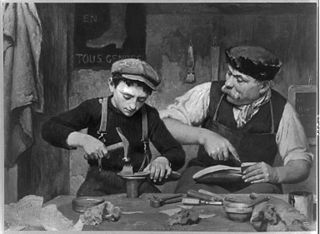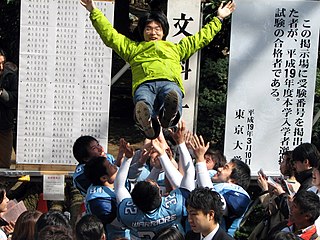
Vocational education is education that prepares people to a skilled craft as an artisan, trade as a tradesperson, or work as a technician. Vocational Education can also be seen as that type of education given to an individual to prepare that individual to be gainfully employed or self employed with requisite skill. Vocational education is known by a variety of names, depending on the country concerned, including career and technical education, or acronyms such as TVET and TAFE.

Apprenticeship is a system for training a new generation of practitioners of a trade or profession with on-the-job training and often some accompanying study. Apprenticeships can also enable practitioners to gain a license to practice in a regulated occupation. Most of their training is done while working for an employer who helps the apprentices learn their trade or profession, in exchange for their continued labor for an agreed period after they have achieved measurable competencies.

RMIT University, officially the Royal Melbourne Institute of Technology, is a public research university in Melbourne, Australia.

A vocational school, trade school, or technical school is a type of educational institution, which, depending on the country, may refer to either secondary or post-secondary education designed to provide vocational education or technical skills required to complete the tasks of a particular and specific job. In the case of secondary education, these schools differ from academic high schools which usually prepare students who aim to pursue tertiary education, rather than enter directly into the workforce. With regard to post-secondary education, vocational schools are traditionally distinguished from four-year colleges by their focus on job-specific training to students who are typically bound for one of the skilled trades, rather than providing academic training for students pursuing careers in a professional discipline. While many schools have largely adhered to this convention, the purely vocational focus of other trade schools began to shift in the 1990s "toward a broader preparation that develops the academic" as well as technical skills of their students.
In Russia, the state provides most education services regulating education through the Ministry of Education and the Ministry of Science and Higher Education. Regional authorities regulate education within their jurisdictions within the prevailing framework of federal laws. Russia's expenditure on education has grown from 2.7% of the GDP in 2005 to 4.7% in 2018 but remains below the OECD average of 4.9%.
NAF is an industry-sponsored nonprofit with a national network of public-private partnerships that support career academies within traditional high schools. Each academy focuses on a theme that addresses the anticipated future needs of local industry and the community it serves in five major "college prep plus" fields of study that encourage and facilitate college preparation and technical training on career paths in finance, hospitality and tourism, information technology (IT), engineering, and health sciences. In 2019, the NFL awarded eight social justice organizations, including NAF, with a $2 million grant for "reduc[ing] barriers to opportunity."

Higher education in Japan is provided at universities, junior colleges, colleges of technology and special training schools and community colleges. Of these four types of institutions, only universities and junior colleges are strictly considered postsecondary education providers. The modern Japanese higher education system has undergone numerous changes since the Meiji period and was largely modeled after Western countries such as Germany, France, Britain, and the United States with traditional Japanese pedagogical elements to create a unique Japanese model to serve its national needs. The Japanese higher education system differs from higher education in most other countries in many significant ways. Key differences include the method of acceptance, which relies almost entirely on one or two tests, as opposed to the usage of GPAs or percentages or other methods of assessment and evaluation of prospective applicants used in Western countries. As students only have one chance to take this test each year, there is an enormous amount of pressure to do well on this test, and the majority of senior high school education is dedicated to doing well on this single test. Japanese students are faced with immense pressure to succeed academically from their parents, teachers, peers, and society. This is largely a result of a society that has long placed a great amount of importance on higher education, and a system that places all of its weight upon a single examination that has significant life-long consequences towards one's socioeconomic status, promising marriage prospects, and a respectable white-collar professional career path.
Dakota County Technical College (DCTC) is a public, two-year technical college in Rosemount, Minnesota, United States. It is located in Dakota County inside the Minneapolis/St. Paul metropolitan area. DCTC belongs to the Minnesota State Colleges and Universities System and is one of five stand-alone technical colleges in the state.

A drama school, stage school or theatre school is an undergraduate and/or graduate school or department at a college or university; or a free-standing institution ; which specializes in the pre-professional training in drama and theatre arts, such as acting, design and technical theatre, arts administration, and related subjects. If the drama school is part of a degree-granting institution, undergraduates typically take an Associate degree, Bachelor of Arts, Bachelor of Fine Arts, or, occasionally, Bachelor of Science or Bachelor of Design. Graduate students may take a Master of Arts, Master of Acting, Master of Science, Master of Fine Arts, Doctor of Arts, Doctor of Fine Arts, or Doctor of Philosophy degree.

Before the arrival of European settlers, who introduced a formal education system addressed to the elites, education in Ghana was mainly informal and based on apprenticeship. Economic activities in pre-colonial Ghana were based on farm produce shared within households and members of each household specialized in providing necessities such as cooking utilities, shelter, clothing, and furniture, and trade with other households was therefore practiced on a very small scale. As such there was no need for employment outside the household that would have otherwise called for disciplines, values, and skills through a formal education system. After colonization, Ghana's economy became a hybrid of subsistence and formal economy.

A university of applied sciences (UAS), nowadays much less commonly called a polytechnic university or vocational university, is an institution of higher education and sometimes research that provides vocational education and grants academic degrees. It should not be confused with vocational schools or technical schools that do not meet the strict standards of higher education nor have the ability to grant officially accredited academic degrees.
Following independence from the Soviet Union, a major economic depression cut "public financing" for education in Kazakhstan, "which dropped from 6% of gross domestic product in 1991 to about 3% in 1994, before rising to 4% in 1999. Elementary- and secondary-school teachers remain badly underpaid; in 1993 more than 30,000 teachers left education, many of them to seek more lucrative employment.

West London College, legally known as the Ealing, Hammersmith and West London College is a large further and higher education college in West London, England, formed in 2002 by the merger between Ealing Tertiary College and Hammersmith and West London College. It is based across four campuses located in Park Royal, Ealing, Hammersmith and Southall districts; the main campus of the college is situated on the north side of the busy A4 dual-carriageway, between Hammersmith and Earls Court. There are over 13,000 students as of 2016, providing training and development from entry level to postgraduate.

The Technical Education and Skills Development Authority serves as the Philippines' Technical Vocational Education and Training (TVET) authority. As a government agency, TESDA is tasked to both manage and supervise the Philippines' Technical Education and Skills Development (TESD). Its goals are to develop the Filipino workforce with "world-class competence and positive work values" and to provide quality technical-educational and skills development through its direction, policies, and programs.
Bird College – Conservatoire for Dance and Musical Theatre is an independent performing arts school and college, located in Sidcup, South East London, in the London Borough of Bexley.
The Technical and Vocational Training Corporation (TVTC) is a training institute in Saudi Arabia. In existence since 23 June 1980, it has branches in all major Saudi cities.

Highbury College is a further education college in Portsmouth, Hampshire, England. It offers vocational and academic education and training, including apprenticeships, A-levels and foundation degrees.
Moscow State University of Printing Arts of Ivan Fedorov is Russia's largest university in the field of preparing specialists in printing and publishing.

Guzman College of Science and Technology is one of the institutions founded by Don Zacarias P. De Guzman in 1947. It is a pioneering vocational college in Manila, the Philippines. Don Zacarias began the college out of sympathy for unemployed individuals who needed work after the devastation of World War II. Louie De Guzman, former head of Guzman College and son of Don Zacarias, has stated that the school has gained enough renown that "leading politicians would be invited on graduation to challenge the graduates."
The levels of education in Åland are primary, secondary and higher education. Education is compulsory between the ages of 6 and 15. Compulsory education consists of six years of primary and three years of lower secondary education. Upon completion of the third year of lower secondary education students can continue to the upper secondary education which is carried out by the Ålands Gymnasium. Higher education is offered at the Åland University of Applied Sciences. Education in Åland is administered and regulated by the Ministry of Education and Culture.











